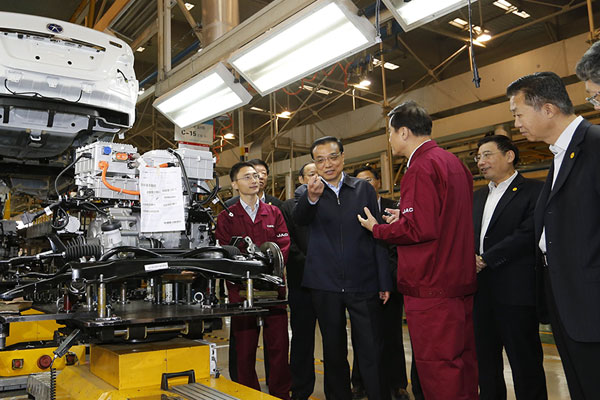
Premier Li Keqiang visits Jianghuai Automobile Corporation to inspect the research and development work being carried out by the company on new energy vehicles in Hefei, Anhui province on Oct 30, 2015.[Photo/Xinhua]
While improving the industrial equipment and heavy chemicals industries, efforts should also be made in “small things” to provide people with consumer goods that meet their needs, Premier Li Keqiang said at the State Council executive meeting on May 11.
At an executive meeting last month, the Premier had emphasized quality standards for consumer goods and upgrade of “Made-in-China” products. This time the Premier stressed efforts to increase product variety and quality and build domestic brands.
“The era of planned economy has gone. Consumer goods will finally be selected by the market. So the market should be given the reins to upgrade the consumer goods industry,” he said.
Upgrade domestic consumer goods industry by consumption upgrade
“Never underestimate small products. It is those ‘small things’ that forge the popularity of ‘Made-in-China’ and create a big market,” said Premier Li as he reminded people at the meeting of the significance of consumer goods industry upgrade.
People’s needs in consumer goods are transforming and being upgraded. Despite the fact that China has already built a relatively complete and wide-ranging consumer goods industry system, there remain problems such as inadequacy of high-quality products, according to the Premier.
With a 1.3 billion population and an increasing number of middle-income families, the momentum of consumption upgrade is vigorous. This will create the most enormous consumption need in the world, and such a great opportunity should be grasped, he said.
Create favorable business environment
To promote upgrades in the consumer goods industry, the first thing that government should do is improve the business environment, Premier Li said.
“Business people told me that they welcome tax reduction, but the very thing they need is streamlining administration and delegating power to lower-level governments, which will lower institutional costs.”
The Premier stressed that consumer goods industry upgrade needs government support, and the key is to further streamline administration and delegate power to lower-level governments, optimize administrative services, and create a favorable business environment.
Strengthen regulation
The second thing to do is strengthen regulation regarding problems such as fake and poor quality products and intellectual property infringement.
The Premier said that when he worked in local government, some food enterprises had to pay 6 million yuan ($920,000) on quarantine re-inspection and inferior-quality product disposal, as they were unsure about the authenticity of the quarantine inspection stamp on procured pork.
The result was that fake and poor quality producers were at large, while enterprises with good-quality products went bankrupt. This is a typical example of “bad money driving out good money,” he noted.
“How can we protect innovation and promote upgrades in the consumer goods industry without improving such a business environment and regulations?”
He also talked about his visit to Switzerland a few years ago, where he was told by a local official that to ensure food safety, farms would be inspected twice a year, and if unqualified products were found, the farms would be deprived of agricultural tax subsidies or even be expelled from the market.
“Only with good regulation can a fair and healthy market be built,” the Premier stressed.
Improve market access
The third thing the Premier stressed is market access improvement.
During his visit to Shanxi in January, an entrepreneur told the Premier that their technology of solar motorcycles received popularity in overseas markets, but the technology was too new to enter the domestic market, as it was not on a product list to get market access.
“We have too many ‘product lists’, which hold back innovative products from entering the market,” he noted.
“How can you set up a list to stipulate products in the market, while all kinds of customization are emerging and consumer needs are changing?”
To promote increases in consumer goods variety and product quality, product lists should not be further expanded, the Premier stressed.
